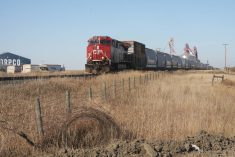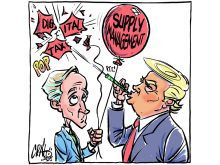TO USE a boxing cliché, Saskatchewan often has punched above its political weight in the past century.
It was where the first influential western farm lobby started with the Territorial Grain Growers Association.
A Saskatchewan MP has been prime minister for 25 years since 1926, the third-longest prime ministerial representation from any province.
It was where Canadian socialism and public medicare first found a home. Electoral socialism started in Winnipeg in 1921 and was institutionalized in Calgary in 1933 but took root in 1935 with the Regina Manifesto, the election of MPs to Ottawa and then a Saskatchewan provincial government in 1944.
Read Also

Agriculture needs to prepare for government spending cuts
As government makes necessary cuts to spending, what can be reduced or restructured in the budgets for agriculture?
With just 4.5 percent of parliamentary seats in 2004 and its moment in the prime ministerial spotlight long gone, Saskatchewan still can boast political distinctions.
Regina’s Ralph Goodale is the first finance minister from the province and a stalwart of the Paul Martin government. New Democrat Lorne Nystrom, if he is re-elected in Regina-Qu’Appelle, will be the dean of the House of Commons with more than 32 years of experience.
Besides, public opinion polls consistently show Saskatchewan as one of the few provinces in a tight three-way party race. While not true in all ridings, it makes for some intense politics.
Since 1993, it is almost as if the 1935 Social Credit populist revolution that transformed Alberta but was hijacked in Saskatchewan by the CCF revolution now has arrived. Conservatives, descendents of the Socreds, hold 10 of 14 seats.
The province has been in political flux and a key issue being raised by candidates is that voters are being taken for granted.
From the Conservative side, there are complaints that Liberal candidates urging voters to support them to vote for a government MP are arrogantly presuming a fourth Liberal government.
“If that would work after all they have done, the Liberals would never have to worry about the voters again,” said Regina-Qu’Appelle Conservative candidate Andrew Sheer, a 25-year-old who is hoping that after 32 years in Parliament, voters will decide it is time to retire Nystrom.
Besides, with polls as they are, voting for a government MP could mean voting Conservative.
In Regina-Wascana, Goodale’s political base for 11 years, Conservative candidate Doug Cryer also raises the arrogance issue.
“I think Mr. Goodale is taking this riding for granted,” said the former Parliament Hill Canadian Alliance aide. “He is never around. I think on June 28 he is in for a surprise.”
In Saskatoon-Rosetown-Biggar, New Democrat candidate and former MP Dennis Gruending is trying to turn the arrogance label against the Conservatives and his incumbent opponent Carol Skelton.
“I’m telling voters, particularly in rural areas, that they are taking their votes for granted,” said Gruending. “The leader is hardly here and when he is, he won’t talk about agriculture. I think that is arrogance.”
Saskatchewan will not determine government this time but its results will be a fascinating glimpse into the state of political play in the province that gave Canada medicare, Tommy Douglas, John Diefenbaker and William Lyon Mackenzie King.
The ghosts of history in one of Canada’s politically seminal provinces are watching.
















